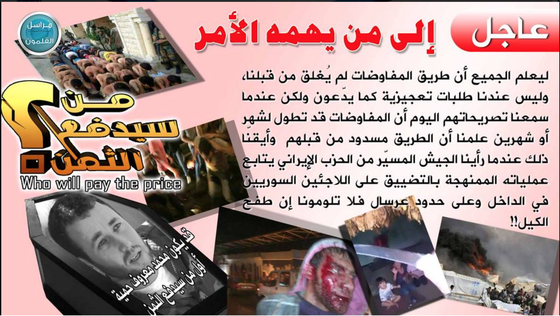Image may be NSFW.
Clik here to view.
In a series of tweets today, the Al Nusrah Front again threatened to kill a Lebanese soldier it is holding hostage. Al Nusrah threatened to kill him in response to operations by the Lebanese army and Hezbollah, the Iranian-backed terrorist organization that is supporting Bashar al Assad's regime in Syria.
"Mohammad Hamiyeh is the first casualty of the stubbornness of the Lebanese military that has become a puppet in the hands of the Iranian party," one of Al Nusrah's tweets reads.
The "Iranian party" in question is Hezbollah, while Hamiyeh is one of the Lebanese soldiers in Al Nusrah's custody. The implication of the tweet is that Hamiyeh has already been killed, but that has not been confirmed.
Al Nusrah uses the hashtags "#The_Lebanese_army_kills_its_soldiers" and "#Who_will_pay_the_price" in its Arabic tweets.
On Sept. 16, Al Nusrah posted a banner with the same question,"Who will pay the price?," written in English. Then in Arabic, the group answers its own question: "Mohammad Maruf Hamiyah might be the first to pay the price." The banner can be seen above.
Throughout the week, Al Nusrah has accused the Lebanese government and Hezbollah of blocking the negotiations to free Hamiyeh and his colleagues.
In the banner, Al Nusrah refers to "negotiations" that "were not blocked by us." The al Qaeda branch adds that it does not "have impossible demands" as some are claiming.
Al Nusrah writes that it became convinced that the negotiations surrounding Hamiyah had been "blocked" when it saw the "Hezbollah-controlled army" continuing its "operations by harassing the Syrian refugees in the country and on the borders of Arsal."
The banner warns: "Do not blame us if we have had enough!!"
It is certainly possible that Al Nusrah will follow through on the execution. The negotiations, which are reportedly being brokered by the government of Qatar, stalled this week. But the al Qaeda group is also likely using the threat as a way to extract a greater ransom, or other concessions in exchange for freeing the Lebanese hostages, if and when the negotiations resume.
The question, "Who will pay the price?," was also used in an Al Nusrah video showing nine captured members of the Lebanese security forces that was released August. The hostages say in the video that Hezbollah must remove all of its forces from Syria or they will be killed. Al Nusrah also has the soldiers and security officials held hostage implore their home towns to rise up in protest against Hezbollah.
The hostages were all reportedly captured in early August, during intense fighting in Arsal, which is in northern Lebanon on the Syrian border. Fighters from both the Al Nusrah Front and the Islamic State, the al Qaeda offshoot that is at odds with Al Nusrah, participated in the operations against Lebanese security forces.
Both groups are holding Lebanese soldiers and security officials hostage. To date, the Islamic State has reportedly killed two of the hostages held in its custody. But the Al Nusrah Front has not yet killed any of its hostages.
In addition to the threats on Hamiyeh's life this week, Al Nusrah has also posted videos purportedly showing its military operations against Hezbollah.
Al Nusrah has been freeing other hostages
In recent weeks, Al Nusrah has portrayed itself as being somewhat lenient with respect to hostages, especially when compared to its jihadist rivals in the Islamic State.
In late August, the group released an American named Peter Theo Curtis. The government of Qatar, which is reportedly helping to broker a deal for the Lebanese soldiers and security officials, also acted as an intermediary in Curtis's case.
Curtis was released just days after James Foley, another American, was brutally executed by the Islamic State.
Earlier this month, Al Nusrah released more than 40 UN peacekeepers from its custody. Al Nusrah's top sharia official, Dr. Sami al Uraydi, portrayed their release as a move consistent with the group's interpretation of Islamic law. Al Uraydi argued that the peacekeepers had been promised safe passage by one of Al Nusrah's "brothers" and it would have been illegal under sharia law to continue holding them, let alone kill them.
According to published reports, Al Nusrah actually received a ransom totaling millions of dollars in return for the peacekeepers' freedom. Al Uraydi did not mention the ransom in his video. As in Al Nusrah's other hostage operations, Qatar helped broker the deal.
In a series of tweets yesterday, another senior Al Nusrah sharia official, Abu Sulayman al Muhajir, made the same argument as al Uraydi. But Abu Sulayman did so in the context of the Islamic State's kidnapping of Alan Henning, a British aid worker.
Abu Sulayman argued that Henning "entered Syria with a covenant of safety" provided by Muslims and, therefore, it is not legal under sharia law for the Islamic State to kill him.
"There is no justification in invalidating the covenant given to Alan Henning by Muslims," Abu Sulayman wrote. It "is binding upon us all." Abu Sulayman added that several prominent al Qaeda-affiliated clerics all "oppose the killing/kidnapping of" aid workers such as Henning. The clerics are Abu Muhammad al Maqdisi, Abu Qatada, Eyad Qunaibi, and Hani Sibai. All four are staunch critics of the Islamic State.
Thus, Al Nusrah's handling of its Lebanese hostages has struck a markedly different tone than its other recent hostage operations.
*Oren Adaki, an Arabic language specialist and research associate at the Foundation for Defense of Democracies, contributed to this article.